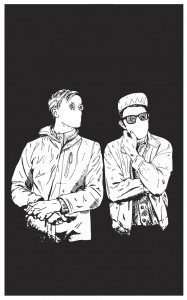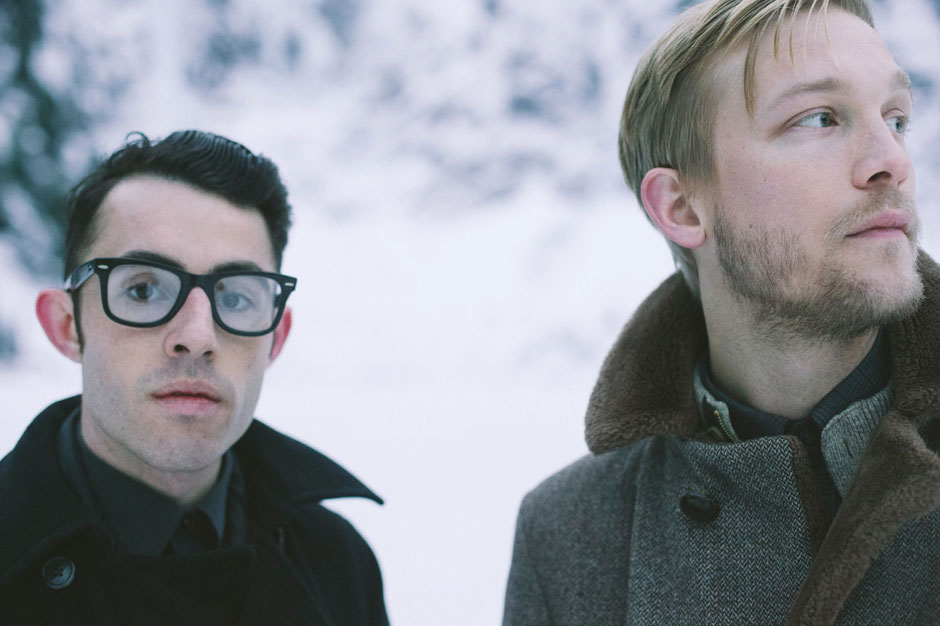 We have a special feature for this week’s segment. Normally I try and bring you some tunes that you guys have never heard of and then give you all a bit of back story. This time instead of hearing the story from me, you’re going to get it straight from the source. Iska Dhaaf (Somali for “let it go”) is an up and coming Seattle band that began recording in 2011. The duo made up of Nate Quiroga (Mad Rad) and Benjamin Verdoes (Mt. St. Helens Vietnam Band) just released their album Even the World Will Burn this past month. It’s some of the more interesting and entertaining indie rock I’ve heard in a long while. Drummer Benjamin Verdoes was kind enough to have a chat with me about the album, working with a duo, and the Seattle music scene. What follows is that interview. ARTIST OF THE WEEK: Iska Dhaaf. Let’s kick it off with their track Everybody Knows.
We have a special feature for this week’s segment. Normally I try and bring you some tunes that you guys have never heard of and then give you all a bit of back story. This time instead of hearing the story from me, you’re going to get it straight from the source. Iska Dhaaf (Somali for “let it go”) is an up and coming Seattle band that began recording in 2011. The duo made up of Nate Quiroga (Mad Rad) and Benjamin Verdoes (Mt. St. Helens Vietnam Band) just released their album Even the World Will Burn this past month. It’s some of the more interesting and entertaining indie rock I’ve heard in a long while. Drummer Benjamin Verdoes was kind enough to have a chat with me about the album, working with a duo, and the Seattle music scene. What follows is that interview. ARTIST OF THE WEEK: Iska Dhaaf. Let’s kick it off with their track Everybody Knows.
KM: Nate used to be in the hip-hop group Mad Rad and you were in the indie rock band Mt. St. Helens Vietnam band, how did you guys initially cross paths?
BV: We had run into each other at Sasquatch and just around the city. We were both promoting our projects really  hard. (Mad Rad) was another band that was pushing things creatively, playing really intense shows, and we kinda had that in common. I had been listening to Mad Rad’s music and I wanted to learn how to make beats. I had never delved into making electronic music so I actually hit up the producer from Mad Rad and started going over to his studio and shadowing him. Then I ended up playing guitar on a song on their second record and then ended up playing shows with them. That’s when Nate and I kinda of got together. I was really impressed with what he was doing. He was a really impressive songwriter. He played with Mt Saint Helens on a song. Then we started collaborating together and since then we haven’t stopped. We’ve been playing almost every day for three years.
hard. (Mad Rad) was another band that was pushing things creatively, playing really intense shows, and we kinda had that in common. I had been listening to Mad Rad’s music and I wanted to learn how to make beats. I had never delved into making electronic music so I actually hit up the producer from Mad Rad and started going over to his studio and shadowing him. Then I ended up playing guitar on a song on their second record and then ended up playing shows with them. That’s when Nate and I kinda of got together. I was really impressed with what he was doing. He was a really impressive songwriter. He played with Mt Saint Helens on a song. Then we started collaborating together and since then we haven’t stopped. We’ve been playing almost every day for three years.
KM: When you guys got together you moved from guitar to drums and Nate took over on guitar despite having never played. Is that correct?
BV: That’s right he only knew how to play a few chords. I had been playing drums off and on, it’s not something I  was every really proficient at. To be honest when we got together we just started writing. Sometimes I would play bass, we’d loop things, we’d both write vocal melodies, and we’d harmonize on things. It was really an interesting process. At a certain point he would come in with riffs and different parts of songs. I would come in with pieces of songs. We developed these different ways of writing songs and then had to figure out how to preform them. That’s when I started doing the drums and the bass. We felt like we had such chemistry between the two of us that it didn’t really make sense to play with other people.
was every really proficient at. To be honest when we got together we just started writing. Sometimes I would play bass, we’d loop things, we’d both write vocal melodies, and we’d harmonize on things. It was really an interesting process. At a certain point he would come in with riffs and different parts of songs. I would come in with pieces of songs. We developed these different ways of writing songs and then had to figure out how to preform them. That’s when I started doing the drums and the bass. We felt like we had such chemistry between the two of us that it didn’t really make sense to play with other people.
KM: Is that what influenced you guys to stay as a duo rather than form a full band?
BV: Precisely. We’ve had people come by. But as far as the vision of it, and the vibe, it was always a duo. We don’t really have a practice schedule. We just know that we’re going to meet every day. We just know that. It’s part of our daily existence. This band is a continuation of what we’re reading and what we’re discussing. It makes it a lot easier both musically and spiritually to keep it just the two of us.
KM: What are you reading?
BV: We recommend books to each other. My girlfriend who is brilliant will recommend books to me. Nate’s been reading Love In The Time Of Cholera. We’re reading different things right now, but we’ve definitely gone back and forth. I got really in to this guy Phillip Larkin, some really dark stuff. T.S. Elliot is what I always go back to. He’s like a staple. Recently I was reading this book Everyone Loves You When You’re Dead by Strauss.
It’s all interviews with famous people he’s done over the last couple decades. It’s really well written. The way he crafts it together. It’s really fascinating how people deal with celebrity in different ways.
KM: In the process of collaborating, how different is it from Mt St. Helens? How has your process evolved?
BV: It’s considerably different. Actually it’s a huge relief. You use a different part of your brain when you’re collaborating with someone. You have different sensitivities. With Mt. St. Helens, the concept, the body of the songs, every decision was mine. Now it’s more of a dialogue. So it becomes really interesting to be like, I wrote the riff inside this song, and he wrote the bridge of the song. It’s a totally fluid experience. People tend to be very protective of ideas. With Nate we shared things very early. It’s a really cool process. I actually learn so much from it. The songs when I listen back, it’s not just me. I get to listen to it like I would listen to other people’s music. It’s a different experience.
KM: So there’s no telling where one person’s contributions begin or end?
BV: Exactly. With the exception of a few songs we really couldn’t play them without each other very easily. Especially with the new songs we’ve been working on. They’re a really interesting blend of parts and they need each part to function.
KM: How long does that usually take?
BV: It’s quite different actually. Some songs we’d spend months on and then we’d come back. We’d shift parts around 20 times until we’d finally figure it out. Other songs it would be a couple weeks, some songs a couple days. Sometimes we’ll just go really hard for like ten hours and spend the next coupe weeks editing. This past weekend Nate was playing guitar, I was playing drums, that’s what we did all weekend. Play one song. The song’s pretty much done now so that’s pretty cool.
KM: How does this affect the recording process?
BV: I feel like the basic structure is pretty set (live), but some of the details aren’t. I generally have to style my drum parts after what’s happening with the bass. But it just depends on the song. Sometimes it will make perfect sense to hammer it out the way we have it at the moment, but sometimes it will be very much an editing process. We’ll go back and snip something or move it around, I’ll play a different instrument over the top of it. With Everybody Knows we’d set up in the same room and we’d do it. We did the drums, guitar, and the vocal live, and then built around it. We’ll usually go back and listen to the mixes. I’ll call Nate or he’ll call me and we usually have the same feeling. We didn’t get it or just didn’t get it right, so we’ll go back and figure out what the song needs.
KM: The first two singles, Happiness and Rumi, were they the first two you ended up recording or were they simply the first you felt were ready to put out?
BV: Well we recorded the first group of songs at the same time. I think All the Kids, True Ones, Happiness, Rumi, and Everybody Knows. We did 3 different sessions early and then we went back and finished the record. But we basically we did groups of songs that we thought were done because we wanted to do seven inches (vinyl). We did these by feel and by season. All The Kids was sort of a summer or spring song. We have these intuitions and want to follow what makes sense and what feels good. These songs feel like what we want to say right now. Then in fall it’s like, Happiness and Rumi made a lot of sense. I don’t know how many bands do that but we just try and do what makes sense to us.
KM: The opening two tracks have a Mt. St. Helens edge to them. They’re fast and aggressive. How has your past work influenced the new stuff?
BV: It’s a hard to tell. We definitely go in these different phases where I feel like we’re dealing with different subject matter. It’s the mood. We’ll go into these modes where we’re really hung up on certain things. As far as Everybody Knows it’s a very aggressive song. It’s sort of influenced by protest music. There’s a sense of urgency about it. I guess I had a lot to do with some of the arrangement in that song. Our producer Ephriam Nagler had an active hand in the delays and stuff. We kinda lean into those moods really hard until we feel like we’ve hit it.
KM: What would you say is the overall theme of your album Even The Sun Will Burn?
BV: I think that a lot of what we’ve noticed in retrospect, a few songs were a about change of one’s self and growing. Ideas on attachment and detachment run rampant within the record. Songs like Two Ones and Dependency are very in the context of how we attach and detach from people. Then you have these elements of drone warfare and how we’re attached to technology and the way that we’re no longer involved with war. Our phones and how we’re supposed to be attached with people all the time and are some how still left with this feeling like we can’t connect. I think that the record approaches these ideas from a bunch of different perspectives. If I had to pick one thing it would be the exploration of the self and how we are connecting to society.
KM: Having this view of detachment in regards to technology, what are you views on social media?
BV: I definitely use stuff. We’ve used Facebook, but for a long time we didn’t use anything mostly because we felt like we didn’t have anything to talk about. But once we started releasing things we used it. There’s not inherent evil or good in social media. It’s just a tool. The real caution with all of these things is how you connect with it. We use it as a tool. I don’t always want to be focusing on our web presence. That’s a sketchy territory I think.
KM: What led you guys to go with the Apocalypse Now vibe with the video for Everybody Knows?
BV: Nate and I were reading a lot of things in the New York Times about what was happening with drones in Yemen and Somalia, all over the place. Even here with the stupid shit you read about Amazon delivering your groceries. It’s just this phenomenon of this thing that’s changing our society. We were reading a lot about that subject and when I was doing research I found this clip from Vietnam. It’s this super 8 clip of these troops dancing on stage with Anne Margaret. It’s really short but it was so beautiful to me. There was this sense of joy. I knew these guys were going to go back out into this terrible circumstance but in that moment there was this feeling of joy and they were so happy. I sent it to the director and he was really into it and he was definitely a fan of Apocalypse Now.
KM: How did Macklemore get involved with that?
BV: Nate sang on a song on his album The Heist and they’ve been friends for years. When we were writing the concept for the video. I was looking at these videos with Bob Hope, and we wanted this Bob Hope figure and Ben (Macklemore) was the first person who came to mind. It really kind of fit with some of the meaning behind this figure that people identify with. Ben’s vibe and just knowing him and what he represents to people was really positive.
KM: Do you think with Macklemore’s success that the focus on Seattle music will be shifting from rock to hip-hop?
BV: He’s helped broaden the focus. Nirvana is obviously in the bigger scope. They sold more records and are historically more important at this point as far as what people know. I think it’s really good. To have bands like Modest Mouse and Death Cab and these quintessential indie bands that have sold records. They broaden the template. That gets more exposure for other really talented people. I think it’s a really rich community. It’s really rare that a city can have the infrastructure and diversity to break bands like Fleet Foxes and then Macklemore, Kingdom Crumbs, Raz Simone, or whoever gets that notoriety.
KM: Are you planning any touring for the record?
BV: We have some festivals lined up. Next Wednesday we are playing Portland, then down to San Francisco, LA and Albuquerque, then Denver, Salt Lake, and Spokane on the way back. Then hopefully in June we will be hopping on other tours. Our plan is to be on tour most of the year. Just really get out there and connect with the people and share the music.
The Album is Even The Sun Will Burn is out now.
Big hugs,
Kelly

LINKS

